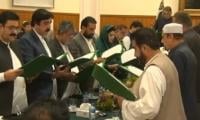KARACHI: Senate Chairman Mian Raza Rabbani on Saturday said that our country got independence from the Britishers under the leadership of Quaid-i-Azam, adding that the Britishers (Gora Sahib) were replaced by Kala Sahib (bureaucracy), feudal lords and landlords, who are violating rights of industrial workers and peasants.
He was speaking at the Sindh Labour Conference organised by the National Labour Council in collaboration with the Sindh Labour Solidarity Committee and the Pakistan Institute of Labour Education and Research (Piler) on Saturday. He said: “We see that the ‘Kala sahib’ has a coalition with other stakeholders of the state and its main objective is to control resources of Pakistan and to perpetuate that control through all means.
Pakistan’s capitalists have partnered with the international capitalists and under international pressure the government has discouraged the trade unions.”
This is why the Senate chairman stressed upon restoration of student unions in universities and colleges and doing away with anti-trade union laws for strengthening of democracy in Pakistan.
“All democratic governments have tried their level best to restore student unions, but the establishment has created hindrances,” he said.
“There is a separate committee to restore student unions where the representatives of establishment paint a gloomy picture of anarchy in educational institutions if the unions are restored.”
The dictatorship supporters had advised the dictators that student and trade unions are the driving forces for any movement so they have suppressed the student and labour unions, he said.
The Senate chairman said that institutions of art and culture were destroyed through a systematic conspiracy. “The movements against Ayub succeeded because of existence of coffee culture, where poets like Jalib, Faiz and Jaun Elia were presenting their revolutionary poetry,” he said.
“Who is Faiz or Jalib from the new generation,” he asked. “Even no one is equal to such people. We do not allow counter narrative against terrorism and the state is discouraging such narrative. However, the narrative of extremists is encouraged.”
He said that the democratic forces were weaker in Pakistan — as poor workers could not reach assemblies — because democratic system allowed only feudal lords and capitalists to contest elections. “For NA or Senate seat one needs crores for election campaigns,” he said.
The Senate chairman added that this system was representative of feudal lords and big businessmen. “That is why when labours die in factory fires, but the capitalists, big businessmen involved in it are not taken to task,” he added.
He said that in Pakistan there were four standards for application of any law. The Senate chairman added: “If you belong to elites, the law will deal you differently. If you are friend of those elites, then the law will deal with you in a different way. If you are wealthy or feudal lord then implementation of law is in another way and if you are a common citizen or a worker then implementation of law is quite different for you.”
Talking about devolution of Employees’ Old-Age Benefit Institution (EOBI), he said it was considered at the time of 18th Amendment and the parliamentary committee had consulted with different stakeholders as there were practical difficulties for those pensioners, who worked at some other place but their families were living in other provinces.
He said: “A procedure was made for payment of pension, but then government of PPP also continued the old system of pension. Our Implementation Committee had proposed that an independent board should be made with representatives of all provinces to run EOBI.”
He said that the Industrial Relations Act (IRA), 2011 — in which idea of trans-provincial unions was introduced — was a better law than IRO 2002. He said: “The High Court of Balochistan has accepted the idea of trans-provincial union. If you need any change, we can introduce amendments in IRA, 2011.”
Speaking on the occasion, National Commission for Human Rights (NCHR) Chairman Justice (retd) Ali Nawaz Chowhan said that the commission was processing a report on bonded labour situation in Pakistan, in which legislation to end bonded labour would be suggested.
He said that the NCHR was committed to implement all the International Labour Organization conventions, which Pakistan had already ratified. The NCHR chairman added: “Tripartite conferences are also important, but unfortunately these conferences were not held after the 18th Amendment in Constitution and there was a need to hold such conferences annually.” He welcomed the Sindh government’s announcement to hold provincial tripartite labour conference in September.
He asked the workers to send their complaints to the commission. He also assured that NCHR will hear their case of non-payment of salaries to lady health visitors.
Supreme Court Bar Association President Rasheed A Razvi said that the National Industrial Relations Commission (NIRC) and labour courts were a cause of concern because they were creating problems for trade unions. He said NIRC and labour courts were ineffective and appointment of retired judges was one of the reasons.
He underlined the need for independent labour judiciary where retired judges were not appointed. “Thousands of trade union cases are pending in NIRC, Karachi, because this law is challenged in high court,” he added.
He said that there were illegal appointments in EOBI, where over 23,000 applications were received and processed within 3 hours and people were appointed on political affiliation in EOBI.
All Pakistan Workers Confederation General Secretary Khurshid Ahmed appreciated the role of Senate Chairman Mian Raza Rabbani for raising problems of labour. He said that there were 72 labour laws, but they were not implemented properly. He regretted that pension amount under EOBI was Rs 5,200 which is quite meagre for the families of workers.
He underlined the need for provision of free legal aid to workers. He added that a judge should be appointed in the high court to exclusively hear labour issues.
Piler Executive Director Karamat Ali said that the present rulers were descendants of the people who sought properties from the British for their loyalties to imperial government.
He said: “Pakistan is the only country which was not properly decolonised in 1947. Unfortunately, the labour rights available before 1947 are not available after the independence. Before the partition, trade union rights were available for all employees except for the uniformed employees.
Mohammad Ali Jinnah was the president of All India Postal Staff Union and he played an active role in making India Trade Union Act, 1926 because he was member of the Indian Legislative Assembly.”
Karamat Ali said not more than 5 percent workers were currently registered with labour supporting institutions like EOBI and Social Security Institutions. He pointed out that in the Indian Act, 1935 there were reserved seats for trade unions. “But now they don’t have such rights,” he added.
In the end, National Labour Council Convener Latif Nizamani said that trade unions must be made strong.
Saad was of the view that the battle of politics should be fought solely through political means
KP govt decided to develop gemstone business as a formal export sector and cluster at the Namak Mandi would be...
Khyber Pakhtunkhwa Minister for Higher Education, Archives, and Libraries, Meena Khan Afridi. — APP FilePESHAWAR:...
Vehicles and horse carts passing through flood water at Bara Bazar area on Khuwani bridge after heavy rain in Peshawar...
Amid the failure to revive the cash-bleeding PIA, government is left with no other option but to sell it to any...
Picture showing the Silver Jubilee Gate of the University of Karachi. — APP File KARACHI: The University of Karachi...







